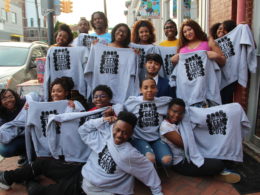When Brittany Greer was working in the nuclear energy sector in a communications role, she was surrounded by men. She knew it was time for a change and wanted to inspire girls to diversify the field. But before creating her organization, she needed to find out why there is such little representation of women in STEM careers.
Much to her shock, Greer found between the ages of eight and 11, girls’ overall confidence dropped by 30%, according to industry research.
Enter Rosie Riveters.
In 2016, Greer opened up one of the few organizations that not only focuses on mobilizing girls before that drop off, but also encourages “productive struggle” – getting things wrong before getting it right and being comfortable with not knowing the answer.
Through its four programs, Rosie Riveters works with girls ages four through 14 to build critical thinking skills and self-confidence. We sat down with Greer to learn more about her mission to inspire the next generation of empowered women and girls in STEM.
What is Rosie Riveters’ core mission?
Our mission is to engage and inspire girls from diverse backgrounds in science, technology, engineering and math.
Why do you think it’s important get young girls involved in STEM?
I think it’s important to have girls, women and everybody involved in the STEM field. STEM is literally creating the solutions for tomorrow, and if we don’t have diverse representation, we’re not serving the population effectively. When we have diverse teams, we are less likely to run into those problems because somebody goes, “Hey, this thing doesn’t listen to me,” or, “Hey, I’m pretty sure my heart rate is not that.” When we can start early, what we as an organization can do is mitigate the impact of all those other hurdles that are existing along the way and provide a support system and resources to help navigate that.
What do you think people don’t realize about the lack of women and girls in STEM being an issue?
Let me put it this way: Still to this day if you ask kids to draw a scientist, they will draw a male, on average. I think being more aware of the fact that this is an issue is critical because you’re going to get more innovation by having more diversity on your team, and that’s clear.
When your day-to-day interaction with some fields are more female-saturated, I think it’s sometimes easy to forget about the lack of representation in other fields. Twenty-eight percent of the STEM workforce is female, 5% of that are women of color. We need to do better, and then we’re all going to be better.
What is the most rewarding thing about what you do?
There is nothing that beats watching a girl go from, “I can’t,” to, “Look what I did!” When we get to look at the confidence built through their own skill sets, it’s the most rewarding thing ever. It’s the reason why volunteers come back, it’s the reason why our volunteers who have full-time jobs in STEM become instructors with us. Getting to see the spark and community we’ve been able to establish…these young women have a really strong ecosystem to support them.
How can others help your mission?
Partnerships are a key part of what we do. If you’re a community partner who wants to integrate STEM, that’s amazing, and a large number of programs are supported by industry. If you’re in an industry who’s looking to recruit more women, that recruitment starts in kindergarten, whether you like it or not. If we can invest in that talent through organizations like Rosie Riveters and others within the region, we can have incredible new hires coming into the pipeline and changing that representation from 28% to far better numbers.
But also come and volunteer with us. Time is really valuable, so we not only love classroom volunteers to support our instructors and facilitate their productive struggle in the classroom, but also women in STEM who want to join us as role models and share their stories.
To support Rosie Riveters’ mission, visit its website here. You can also follow the organization on Instagram, Facebook and Twitter.











Well written and inspiring article. Salute, Brittany Greer.